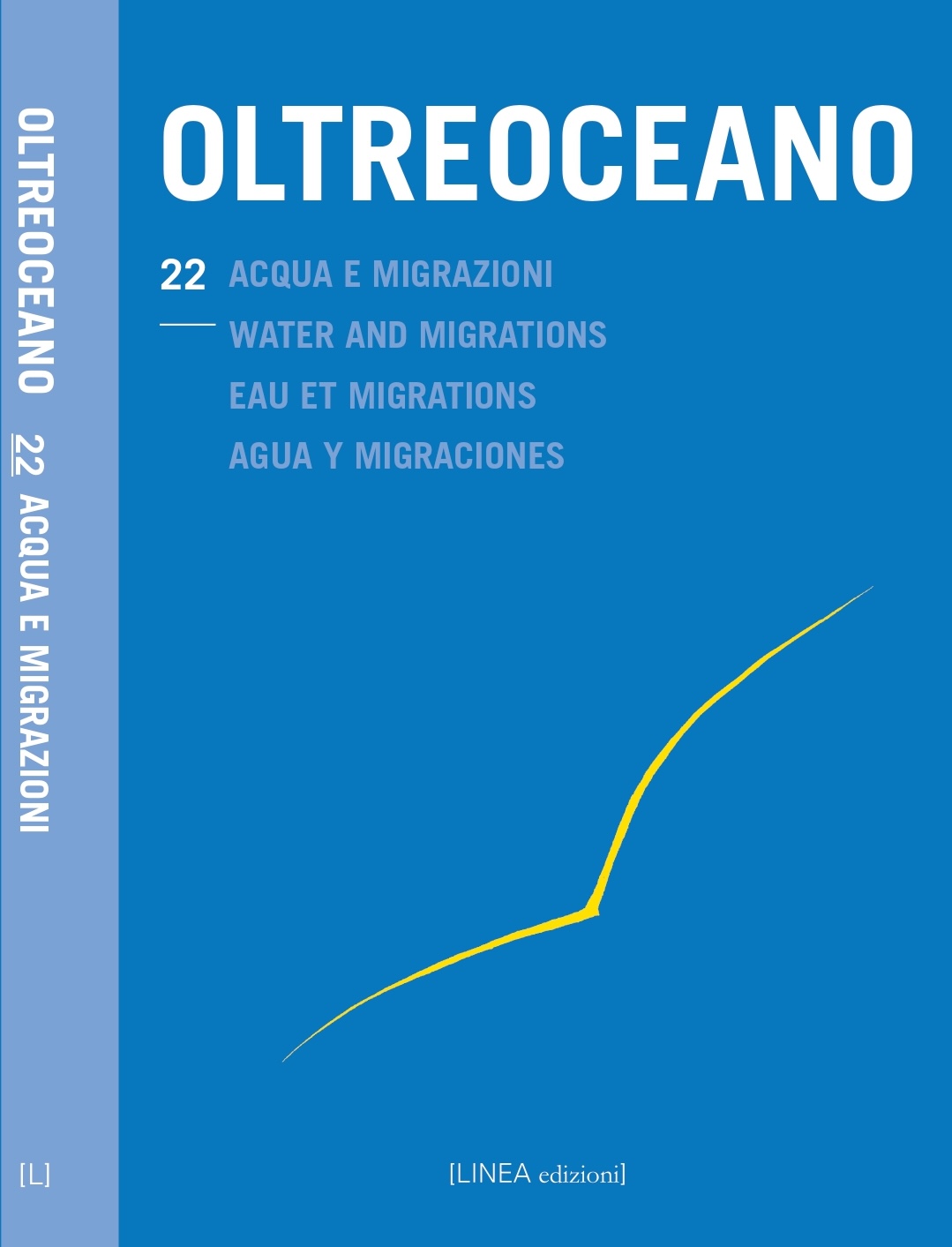“Water is Life”: Indigenous Views on Water and Wom
DOI:
https://doi.org/10.53154/Oltreoceano80Keywords:
Water, Women, Indigenous Knowledge, Katherena Vermette, K Dawn MartinAbstract
The current water crisis is disproportionately affecting many Indigenous communities across Canada, where the lack of access to water has life-threatening effects on Native health and, in particular, on Indigenous women and girls who are more vulnerable to waterborne infections and mental health problems resulting from water deprivation. Moreover, the inability to carry out their domestic tasks makes women more exposed to lateral violence within their households. To counter this violence against women and water, Indigenous women writers are drawing on their traditional knowledge to assert the sacredness of water and of women as water carriers and life-givers. As part of their broader decolonizing politics to oppose settler-colonialism and destructive views of the Earth as a commodity, they are reasserting their peoples’ traditional roles as water protectors and emphasizing the vital and transformative role of water as a source of life and renewal. This article analyses Katherena Vermette’s collection of poetry river woman and K Dawn Martin’s performative piece “Kahnekanoron – Water is Life” which offer a counter discourse to both the settler view of water as a source of profit and the migrant view of water as a passageway to an unknown Eden. The aim is to show how Indigenous views of water as a source of interconnection between humans, animals and nature offer an alternative to Western ideologies of exploitation of the Earth and to the colonial mindset that spurs unequal and violent relations among human beings. The woman-water connection elicited in these poems emphasizes the importance of both for our survival, but also sheds light on how both are intertwined as an effect of patriarchal violence. Ultimately, by celebrating water as a living being, these writers posit water as a site of resistance and healing from the wounds of colonization.
Downloads
References
Assembly of First Nations (AFN). Honouring Water. Retrieved from https://www.afn.ca/honoring%20water/#:~:text=Water%20is%20the%20blood%20of,Earth%20and%20for%20our%20health (Last accessed 05/05/2023).
Chiefs of Ontario. (2001): Drinking Water in Ontario First Nation Communities: Present Challenges and Future Directions for On-Reserve Water Treatment in the Province of Ontario. Part II Submissions to the Walkerton Inquiry Commission. 25 March. Retrieved from http://www.archives.gov.on.ca/en/e_records/walkerton/part2info/partieswithstanding/pdf/chiefsofontario.pdf (Last accessed 05/05/2023).
Cook, K. (1999): Grand Mother Moon. In Haudenosaunee Environmental Task Force (Ed.), Words That Come Before All Else: Environmental Philosophies of the Haudenosaunee (pp. 139-142). Cornwall Island, ON: Native North American Travelling College.
Gaertner, D. (2019): Review of river woman. Journal of Mennonite Studies 37, pp. 381-385. Retrieved from https://jms.uwinnipeg.ca/index.php/jms/article/view/2020/1945 (Last accessed 05/05/2023).
Greeley, J. (2017): Water in Native American Spirituality: Liquid Life–Blood of the Earth and Life of the Community. Green Humanities 2, pp. 156-179.
Gursoz, A. (2014): Meet Josephine Mandamin (Anishinaabekwe), The “Water Walker”. Post on Indigenous Rising: An Indigenous Environmental Network Project. 25 September. https://indigenousrising.org/josephine-mandamin/ (Last accessed 05/05/2023).
LaDuke, W. (1999): All Our Relations: Native Struggles for Land and Life. South End Press.
Maracle, L. (1996): I Am Woman. A Native Perspective on Sociology and Feminism. Vancouver: Press Gang Publishers.
Martin, K.D. (2017): Kahnekanoron – Water is Life. Indigenous Arts & Stories. Retrieved from http://www.our-story.ca/winners/writing/5989:kahnekanoron-water-is-life (Last accessed 05/05/2023).
McGregor, D. (2008): Anishinaabe-Kwe, Traditional Knowledge and Water Protection. Canadian Woman Studies/Cahiers de la femme 26, 3 & 4, pp. 26-30. Retrieved from https://cws.journals.yorku.ca/index.php/cws/article/view/22109/20763 (Last accessed 05/05/2023).
McGregor, D. (2012): Traditional Knowledge: Considerations for Protecting Water in Ontario. The International Indigenous Policy Journal 3, 3, Art 11, pp. 1-21. Retrieved from https://ojs.lib.uwo.ca/index.php/iipj/article/view/7385/6029 (Last accessed 05/05/2023).
McGregor, D. (2015): Indigenous Women, Water Justice and Zaagidowin (Love). Canadian Woman Studies/Les Cahiers de la Femme 30, 2 & 3, pp. 71-78. Retrieved from https://cws.journals.yorku.ca/index.php/cws/article/view/37455 (Last accessed 05/05/2023).
Mother Earth Water Walk. https://motherearthwaterwalk.com (Last accessed 05/05/2023).
Robb, P. (2019): Ottawa Writers Fest: Katherena Vermette Goes with the Flow of History and Her Story. Interview with Katherena Vermette. 19 October. Retrieved from https://artsfile.ca/ottawa-writers-fest-katherena-vermette-goes-with-the-flow-of-history-and-her-story/ (Last accessed 05/05/2023).
Ruzek, J. (2020): Review of river woman by Katherena Vermette. The Goose 18, 1, pp. 1-4. Retrieved from https://scholars.wlu.ca/thegoose/vol18/iss1/4 (Last accessed 05/05/2023).
Vermette, K. & MacPherson, E. (2016): this river. National Film Board of Canada. Retrieved from https://www.nfb.ca/film/this_river/ . (Last accessed 05/05/2023).
Vermette, K. (2018): river woman. Toronto: Anansi.
Downloads
Published
How to Cite
Issue
Section
License

This work is licensed under a Creative Commons Attribution-NonCommercial-ShareAlike 4.0 International License.
The authors undertake to comply with the following conditions, which are considered accepted at the time of submission of their contributions.
The sending of a text implies that it is unpublished and not submitted to be published elsewhere.
1. If accepted, the author shall confer on the publisher the right to publish and distribute it both in paper form and in the online electronic edition. The published articles will be downloadable and made available in open access.
2. Provided that it correctly indicates that the first publication took place in the journal Oltreoceano. Rivista sulle migrazioni the author has the right to: a) reproduce the article in separate extracts or collected in a volume; b) publish the article on their personal website or teaching site provided that these sites are of a non-commercial nature; c) deposit the article in online archives of a non-commercial nature, linked to the institution they belong to or as part of projects for the non-commercial dissemination and open access of scientific works.
The use of contributions by third parties, for commercial or otherwise unauthorized purposes, is not allowed. The publisher declines all responsibility for the unauthorized use of the material published in the journal.












